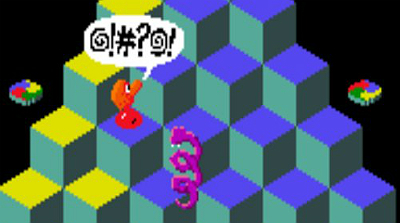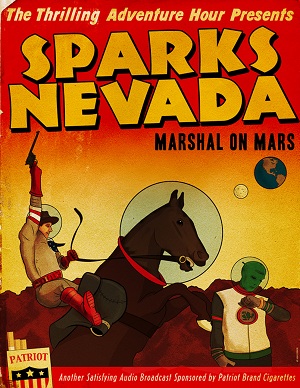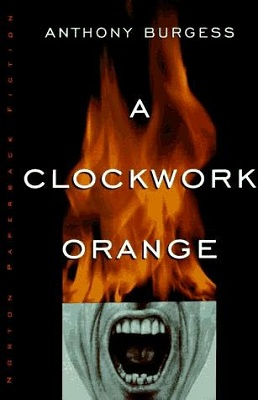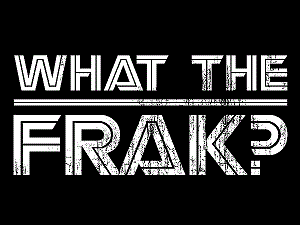The Ten Best Science Fiction Profanities
 |
Who doesn’t like swearing? Actually, quite a lot of people now that I think about it. Nevertheless, profanities are a cornerstone of language, and if you’re a science fiction writer, making up your own swears is a nifty way to create the feeling of an alien culture. Nothing quite displays the values of a society as what they find offensive, and the way a character chooses to curse can tell you some key things about them, even if you don’t understand the language they’re cursing in.
If your story is set in the future, a well-placed fictional epithet can also demonstrate the ways society has changed. With one stroke, you can be both creative and crass, and get some world-building points to boot, crucial if you’re going to keep people interested. Plus, it’s always pleasing as an audience member to know that after we’ve made contact with other races we’ll still be getting upset and dropping f-bombs of some sort, even if they aren’t the particular f-bombs we’re more familiar with today.
Consider this, then, the outer space version of the “Seven Dirty Words” plus three. We’ll be disregarding the memorable Chinese curses from the Firefly universe; not because they don’t count, but because TR already tackled that subject in another list. Even without those, however, we have a very healthy selection to pick from, so don’t you worry. It’s not a comprehensive list by any means, but should you ever find yourself at a con surrounded by hardcore cosplayers who only choose to speak in specific fictional languages, you will at least be able to tell all of them to fuck off in ways they’ll each be able to understand. And isn’t that what real communication is all about?
10) “PetaQ” (Star Trek).
With its harsh syllables and slightly terrifying throat noises, Klingon seems like a language that was made for insults. There are many, but the most well-traveled would have to be this one, pronounced “peh-tahkh”, with extra emphasis on the “hkh”. It’s spelled any number of ways (this one comes from the official Star Trek Wiki, Memory Alpha) and generally translates to “fool” or “coward” depending on the context. It’s appeared in every Trek TV show since The Next Generation, and Worf has found himself on both the giving and receiving ends of it on numerous non-fan fiction occasions. Other handy Klingon put-downs include “Sli-Vak” (whore), “taHqeq” (liar) and whatever the hell Picard says here (supposedly it’s “qu’vatlh guy’cha b’aka”, if that means anything to you). It’s probably a great honor to be told that you swear well by a Klingon, even if Picard doesn’t quite land the pronunciation. Here’s hoping we eventually get that Klingon version of Rosetta Stone, so we can all conduct ourselves as admirably.
9) “Bagropa” (Sparks Nevada: Marshal on Mars).
 |
If you aren’t acquainted with The Thrilling Adventure Hour, I highly recommend you check it out at your leisure as it is tremendous fun. It’s a live stage show put on in L.A. once a month that pays homage to/spoofs classic radio shows, managing to be both extremely goofy and cleverly written with a surprisingly tight continuity and truly staggering attention to detail (as well as a huge roster of cult favorites in the regular cast, including James Urbaniak and Nathan Fillion). Anyone who thinks of high school drama club with more nostalgia than horror will probably be right at home.
Several serials exist within the world of TAH, each spoofing a certain genre of radio drama, from the horror/mystery tale to wartime action stories to Depression-era melodrama. One of the most enduring is Sparks Nevada: Marshall on Mars, a space western following the titular lawman’s attempts to bring justice to the recently colonized red planet. Marc Evan Jackson’s dry, disaffected performance in the lead role is a huge part of what makes the show work, but the show-stealer is often Croach the Tracker, Nevada’s blue-skinned Martian sidekick. Played by Mark Gagliardi as a cross between Spock, Kryten and Tonto, Croach is a hilarious and inspired creation, the product of an unnecessarily formal culture who is constantly apologizing and declaring himself “under onus” to others for trivial reasons. His shocked expression of “bagropa!” in moments of surprise is one of the show’s many notable catchphrases, right up there with Sparks Nevada’s “I’m…from Earth”.
As I’ve only listened to the episodes available through iTunes, I’m not sure if we’ve yet learned exactly what this word literally means; it seems to be more along the lines of “My God!” than anything really vulgar. Still, it’s definitely a swear, and a fun one at that. It’s nice to know that even an overly stiff Marjun can allow himself a cuss or two without increasing his onus. Most of the time, anyway.
8) “Frag” and “Shrock” (tie) (Babylon 5).
There are many intellectual reasons why a writer might invent alien swears for their story, but sometimes it’s just a way to say “fuck” on TV (I almost feel bad for the shows that can’t really use swears because they don’t have their own fictional language. Think how much crazier The Mob Doctor would be if it were set on a star cruiser in the year 4756 or something). “Frag”, like many items on this list, is functionally a substitute f-word but it also serves an occasional dramatic purpose, or at least demonstrates the way idioms are gradually transmitted between different races. Kind of. I’m also a little in love with “schrock”, the harder-sounding version of the s-word and a favorite of Ambassador G’Kar. It’s perfect for nearly any occasion, whether your fleet is getting blown out of the sky or you’ve just read the fine print on Minbari mating rituals.
7) “Drokk” (Judge Dredd).
The residents of Mega City One know this useful little expletive by heart, especially if they happen to be perps being hunted by the deadliest Judge in the district (or hiding from him in a robot filled with spaghetti). “Drokk” also happens to be the title of an unused score for the Karl Urban-starring Dredd, a fantastic homage to the moody Carpenterian synth tracks of old (assuming you like that sort of thing, of course; this is coming from someone with the “Snake Shake” in permanent rotation on his iPod). Had the filmmakers gone with the original soundtrack, I might have actually gone to see it.
Although “drokk” is a versatile word not limited to one particular part of speech, in 100-something years this album title will just be “Fuck”, which is all the more reason to get it now before it gets banned.
6) Shazbot (Mork and Mindy).
These days, the word “shazbot” is more strongly identified with the popular FPS Tribes, but once upon a time it was just a silly joke on Mork and Mindy. The number of results an average Google of “shazbot” will turn up tend to skew heavily in favor of memes with Tribes faces on them over Robin Williams banging his head, although I suppose that’s just a testament to the durability of the word, if you want to call it that. The thing has definitely been run through the meme machine and back again, making you wonder if hundreds of years from now it will be the name of the president or something (assuming he doesn’t lose the recount to Exidor).
Even if you have no idea where it came from, “shazbot” is just an enjoyable thing to say, one of the many quirks that endeared us so much to Mr. Williams back in the ’70s, before there was an entire Hollywood cottage industry built around movies in which he did funny voices and people stood around and laughed at him for five minutes. It should surprise no one that Shazbot is the name of several bands, as well as the robot butler I will build for myself once I finally become a rich and famous Daily List writer.
5) “Grahzny Bratchny” (A Clockwork Orange).
 |
Few visions of the future center around language as much as Anthony Burgess’ essential novella A Clockwork Orange, and in “Nadsat” it still has one of the most expertly constructed alternate fictional dialects ever imagined, a flavorful blend of Cockney English, Russian and childish gibberish. Examples of memorable phrases abound, from “rassoodocks” to “yarblockos”, but for our purposes there’s no beating this one, which of course is derived from Russian and translates to “dirty bastard”. I don’t actually think this particular phrase made it into the film, despite the fact that Kubrick used the book instead of a screenplay for much of shooting. All the same, it’s a very catchy phrase, and reflects the dark verbal playfulness of this invented language in its familiar sing-songy rhythm. And it’s also the name of a band, so there you go.
4) “Frell” (Farscape).
In English, most of the more popular curses tend to employ hard consonants, so the concept of a vociferous swear with a soft “l” sound does seem strange to Westerners (“hell” doesn’t really cut it. “Balls” is the only one that comes close, in my opinion). But then, astronaut John Crichton was lost in an alien universe with mysterious rules he didn’t understand at first, even with the handy translator microbes. The vocabulary of Farscape helped enforce the strangeness of these surroundings, especially when it came to profanity. Throughout the entirety of the show’s run we had the chance to hear many different terms, ranging from parts of the anatomy to insults to words that just sound a lot like “fuck”. “Frell” is a little different, but it’s neat to see how the actors are able to make it sound just like its Earthly cousin despite the lack of the sort of pleasing “k” sound we expect. A rare but significant victory for lateral articulation, for all my linguistics readers out there.
3) “Nerf herder” (Star Wars).
This one always made me imagine a little guy with a staff leading sentient yellow foam balls around in the desert (that’s got to be a Tee Fury shirt somewhere). Regardless, Princess Leia’s classic rebuff to the insolence of Han Solo makes emotional sense even if you have no clue what a nerf is supposed to be or how you herd it. You’ll be interested to know that according to the greater Star Wars universe, the nerf is pretty much what you think it is, if you think it’s an acid-dripping space yak that makes great sausage. For the record, their herders are proud and industrious folk not entirely deserving of the negative connotations. Another fan favorite obscenity from the Star Wars universe is the ever-popular “fierfek”, but it just doesn’t have quite the same cultural legacy.
2) Smeg (Red Dwarf).
Depending on who you talk to, this is either a brand of refrigerators or one of the best futuristic invectives ever; chances are heavily in favor of the latter. Red Dwarf spawned many colorful slang terms during its 25-year run, and words like gimboid, goit, modo, and twonk are all surely cornerstones of the 23rd century’s urban dictionary. The greatest of these is not hop, but smeg, a word that’s so much fun to say it’s kind of become a real swear. The derivations are nearly endless: you can tell someone to smeg off, call them a smeghead, command them to shut the smeg up, or simply exclaim “smegging hell!” in a moment of duress. It was a key element of the show’s lifeblood throughout the series, and some uses that occurred in the later episodes were quite inventive. Who could forget Lister introducing himself to a medieval king in a VR simulation as “Sir Lister of Smeg”? Or the Dwarf-themed version of a popular cooking show entitled “Can’t Smeg, Won’t Smeg”? Smegging classic.
But out of all of these, the moment that stands out the most is guilt-ridden mechanoid Kryten’s inability to use the word to insult Rimmer, only managing to call him a “smee hee”. Despite what it sounds like, this usage doesn’t seem to have anything to do with the biological substance known as smegma, at least not intentionally. Assuming Esperanto doesn’t become the language of the future, here’s one thing we all have to look forward to in the next three million years.
1) “Frak” (Battlestar Galactica).
 |
| T-Shirt Bordello |
Generally speaking, the human civilizations of the Battlestar universe really didn’t differ that much from the ones they would create: you would think more would change over the course of centuries than the invention of page corners. “Frak” was one of the more noticeable differences, so satisfying and recognizable, yet clearly not of Earthly origin. Conceived for the original 1970 series of Battlestar Galactica, it was popularized in the re-imagined Ronald D. Moore version, where it got its four-letter spelling and much more screentime. It was a convenient way to circumvent the censors and allowed the intensity of the series’ drama to hit home (let’s just hope the Capricans never discovered a certain potentially dangerous method of extracting natural gas; otherwise things could have become quite confusing).
One of the more memorable real life (mis)uses of “frak” came when KFC temporarily launched an ill-advised tie-in titled “the Frak Pack” (which, as Rob pointed out, really just means “fuck pack”). The “Frak Pack” would also have been a clever way to refer to the Battlestar Galactica cast had they stayed together and made a bunch of era-defining movies with an 80’s soundtrack. Ah, well. Though the glory days of Edward James Olmos looking dour in the CIC may be well behind us, we can all still enjoy this piece of linguistic cleverness and thank the profanity gods that someone figured out a functional way to bring the fine practice of swearing into the fight against the Cylons. So say we all.

